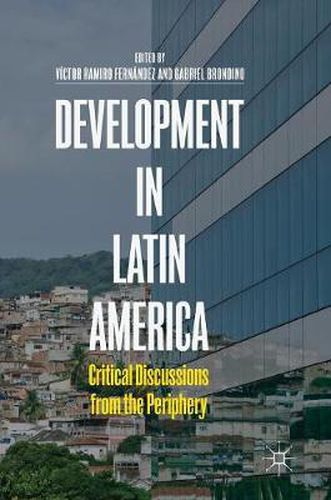Readings Newsletter
Become a Readings Member to make your shopping experience even easier.
Sign in or sign up for free!
You’re not far away from qualifying for FREE standard shipping within Australia
You’ve qualified for FREE standard shipping within Australia
The cart is loading…






This title is printed to order. This book may have been self-published. If so, we cannot guarantee the quality of the content. In the main most books will have gone through the editing process however some may not. We therefore suggest that you be aware of this before ordering this book. If in doubt check either the author or publisher’s details as we are unable to accept any returns unless they are faulty. Please contact us if you have any questions.
This edited volume discusses the development theory advanced by the Economic Commission for Latin America and the Caribbean (ECLAC) in the 1940s, and its transformations through the second half of the twentieth century. In this time frame, the authors identify two approaches: structuralism (1950-1980) and neo-structuralism (1980-onwards). The contributors describe the transition in terms of economic theory and policy; the conceptualization of the State; and the consideration of space on regional and global scales. They argue that structuralism is still relevant for understanding the current problems of development if a careful and appropriate recovery and update of its main ideas and concepts is made in relation to the current context of globalization and internationalization of production and finance.
$9.00 standard shipping within Australia
FREE standard shipping within Australia for orders over $100.00
Express & International shipping calculated at checkout
This title is printed to order. This book may have been self-published. If so, we cannot guarantee the quality of the content. In the main most books will have gone through the editing process however some may not. We therefore suggest that you be aware of this before ordering this book. If in doubt check either the author or publisher’s details as we are unable to accept any returns unless they are faulty. Please contact us if you have any questions.
This edited volume discusses the development theory advanced by the Economic Commission for Latin America and the Caribbean (ECLAC) in the 1940s, and its transformations through the second half of the twentieth century. In this time frame, the authors identify two approaches: structuralism (1950-1980) and neo-structuralism (1980-onwards). The contributors describe the transition in terms of economic theory and policy; the conceptualization of the State; and the consideration of space on regional and global scales. They argue that structuralism is still relevant for understanding the current problems of development if a careful and appropriate recovery and update of its main ideas and concepts is made in relation to the current context of globalization and internationalization of production and finance.